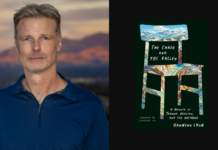Why Psychosis Is Not So Crazy: A Conversation with Stijn Vanheule
Vanheule urges clinicians to listen for the structure in psychotic thought. He offers clinical examples that reframe hallucinations as a form of creative response to unspeakable dilemmas.
A Therapist Navigating Antidepressant Withdrawal: Nelson Lee on the Power of the Present Moment
Therapist and coach Nelson Lee joins us on the podcast to discuss how he approaches helping clients while navigating the complexities of antidepressant withdrawal.
“Progress Only Occurs when People Make Demands”: Paolo del Vecchio Reflects on a Life...
Paolo del Vecchio speaks with Leah Harris about his decades of public service at SAMHSA, what worries him most about mental health in today’s America, and where he sees hope in the recovery movement that he helped create.
The Poetics and Politics of Our Mental Health Metaphors: An Interview with Laurence Kirmayer
Ayurdhi Dhar interviews influential cultural psychiatrist Laurence Kirmayer on how metaphors, histories, and social structures contour our experiences of suffering and healing.
Kermit Cole: Dialogical Therapy and Quantum Theory Walk Into a Bar…
On the podcast this week we are joined by Kermit Cole who shares his thoughts on how humor can help in creating a shared experience that is helpful to the healing process. Kermit, in his experiences of being with people in psychotic states, has seen humor as a moment when a connection can be made. In many ways, this project is bringing Kermit back full circle to his work as a film director, early in his professional career.
Chemically Imbalanced: Joanna Moncrieff on the Making and Unmaking of the Serotonin Myth
Joanna Moncrieff joins Robert Whitaker to talk about her latest book, titled Chemically Imbalanced: The Making and Unmaking of the Serotonin Myth. They discuss the serotonin story and the fact that there is no good evidence that a serotonergic deficiency is a primary cause of depression.
Teralyn Sell and Jenn Schmitz: Breaking Out of the Prison of Prescribing and Finding...
On the Mad in America podcast, Brooke Siem talks with Teralyn Sell and Jenn Schmitz about their journey from working in the prison system to challenging conventional psychiatric narratives in their therapy practice and podcast, The Gaslit Truth.
Psychology’s Small Stories and the Call of the Other: An Interview with David Goodman
Ayurdhi Dhar interviews David Goodman about his vision for a psychology grounded in care for the other, the risks of psychotherapeutic standardization, and why humility—and even embarrassment—may be vital to human flourishing.
Psychotherapy and Psychosomatics: End of an Era for Independent Journals? An Interview With Giovanni...
Giovanni Fava joins us to discuss the uncertain future of the journal 'Psychotherapy and Psychosomatics' which he edited for thirty years and which has been essential to our understanding of the impact of psychiatric treatments.
Psychology, Personhood, and the Crisis of Neoliberalism: Jeff Sugarman on Theoretical and Critical Psychology
Tim Beck interviews Jeff Sugarman on the psychology of personhood, the influence of neoliberalism on mental health, and the need for a more philosophically informed psychology.
Exploding Myths About Schizophrenia: An Interview with Courtenay Harding
The Vermont Longitudinal Study, led by Courtenay Harding, belied conventional beliefs about schizophrenia by showing remarkably good outcomes for patients discharged in the 1950s and '60s.
Psychotherapy and Social Change: Mick Cooper on Counseling, Pluralism, and Progressive Politics
Javier Rizo interviews Mick Cooper on the intersection of psychotherapy and social transformation, the pluralistic approach to counseling, and the role of psychology in building a more just society.
“All Real Living Is Meeting”: Brent Robbins on Love, Death, and the Possibilities of...
Psychologist and existential thinker Brent Robbins reflects on a lifetime of work, the limits of psychiatric diagnosis, and what facing mortality has taught him about joy and human connection.
Kids Are Not the Problem: An Interview With Gretchen LeFever Watson
In this interview, Brooke Siem, who is the author of a memoir on antidepressant withdrawal, May Cause Side Effects, interviews Gretchen LeFever Watson, PhD.
Gretchen...
Peer Support and Resistance: Becky Brasfield’s Vision for Mental Health Justice
In this interview with Ayurdhi Dhar, Becky Brasfield calls for radical truth-telling in the mental health system.
Mad Sisters: An Interview With Susan Grundy
Susan Grundy on her lifelong caregiving journey for an older sister diagnosed with schizophrenia at the age of 13.
The Anatomy of Anxiety: An Interview With Ellen Vora
Dr. Ellen Vora, author of 'The Anatomy of Anxiety', joins us to discuss trauma, grief, functional medicine and more.
One Person’s Journey from Celebrity Medical Model Advocate to Skeptic: An Interview with Rose...
Rose Cartwright is a screenwriter and the author of Pure, a hugely successful memoir which was then turned into a series for Channel Four....
We Should Listen to Our Emotional Pain: An interview with Paul Andrews
Dr. Paul Andrews is an Associate Professor of Evolutionary Psychology in the Department of Psychology, Neuroscience and Behaviour at McMaster University. His research focuses...
Why Does a Parent Medicate a Child? An Interview with My Mother
When Brooke Siem was 15 years old, her father died. Her mother, Dee Barbash, sought help for her daughter that led to a prescription for a psychiatric drug. In this interview, they look back on that fateful decision.
From Freud to Fanon: How Daniel Gaztambide is Redefining Psychoanalytic Practice
In this interview, Daniel Gaztambide discusses how decolonial perspectives can transform psychoanalytic practice.
The Path from Trauma to The Power of Nature: An Interview with Banning Lyon
Our guest today is Banning Lyon, author of The Chair and The Valley: A Memoir of Trauma, Healing, and The Outdoors. An account of...
Multiplicity and Mad Studies: An Interview with Jazmine Russell
In this interview, Jazmine Russell describes her journey through psychosis and mental health advocacy to embracing a multiplicity of frameworks in Mad Studies.
The Maudsley Deprescribing Guidelines: An Interview with David Taylor and Mark Horowitz
Tapering should be tailored and adjusted to the patient, slowed and more hyperbolic in people who have severe and longstanding reactions.
Our Medical System Protects Wrongdoers and Punishes Whistleblowers: An Interview with Carl Elliott
MIA’s Ayurdhi Dhar interviews Carl Elliott about scandals in psychiatry and the challenges faced by whistleblowers.

































